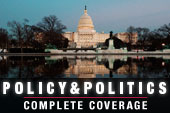An audacious 13-hour filibuster challenging the Obama administration’s drone policy and a subsequent victory in a straw poll of the Conservative Political Action Conference -- the nation’s premier conservative organization -- practically overnight turned freshman Sen. Rand Paul of Kentucky into one of the hottest prospects for the 2016 GOP presidential nomination.
The curly-haired ophthalmologist and son of libertarian icon Ron Paul has long championed the Tea Party’s anti-big government, anti-spending, anti-taxes and anti-foreign aid views and has repeatedly proved his bona fides with the conservative media. Now that he is being mentioned in the same breath as presidential wannabees Marco Rubio, Jeb Bush and Paul Ryan, the Kentucky Republican has begun to temper his message.
RELATED: THE 10 RICHEST MEMBERS OF CONGRESS
Just last week, Paul gave a speech in support of legalizing millions of undocumented immigrants – two years after he pushed to end birthright citizenship of illegal immigrants. And in an appearance on Fox News Sunday last week, he voiced support for ending prison terms for convicted drug users and said the federal government should leave it to the states to decide whether to sanction same-sex marriage.
Paul is flying high, and was just invited to deliver the much coveted keynote address to the Iowa State Republican Party in May. He argues that he may be the best of the lot in bridging a left-right spectrum of views to appeal to young people, minorities and independents.
But even with his not-so-subtle shift to the center on a few key issues, some political experts say his flaws as a national candidate may be too great to overcome. And with three and a half years to go before the next presidential election, it is possible Paul has peaked too soon. For that matter, can any of the current crop of Republican presidential aspirants sustain this momentum for another three years?
The more urgent problem for Paul and other Republican hopefuls is one that was identified by the Republican National Committee in its post-election analysis issued earlier this month. In the wake of Mitt Romney’s stunning loss to President Obama Unless the country undergoes a fundamental ideological, demographic and economic shift in the next three years, the next GOP nominee is doomed to repeat the failure of former Massachusetts governor Mitt Romney.
RELATED: Rick Perry and Rand Paul Slug it Out in Prep for 2016
A close examination of each possible candidate’s views paints a formidable path to victory in a national election. Taken as whole, their platforms are out of line with the views of the majority of voters who reelected President Obama last November. Their stances on social issues like gay marriage and abortion are outdated and appeal mainly to the conservative GOP base. Much of their rhetoric on immigration turns off Hispanic voters, and their policies will do little to attract women and African Americans. The party is losing young voters in droves and its platforms do little to attract them. And Republican economic policies fail to win the favor of the average American.
We are not the ones making this judgment. The RNC said the same thing in their report. They warned that without a significant rethinking of GOP policies, the party was in danger of becoming a relic. But since the report was issued, the process of reinvention has been stagnant. Republican hopefuls who spoke at CPAC a week ago did little to distance themselves from the past.
Freshman Sen. Marco Rubio of Florida, considered one of his party’s freshest faces and most promising national figures, told a packed audience at opening day of CPAC in suburban Washington, D.C., that the Republican Party doesn't need any new ideas in order to succeed. "We don't need a new idea,” he said. “The idea is called America, and it still works."
Of the people being mentioned for 2016 -- Rand Paul, Rubio, Rep. Paul Ryan of Wisconsin, Gov. Chris Christie of New Jersey, Gov. Bobby Jindal of Louisiana, former Florida governor Jeb Bush, freshman Sen. Ted Cruz of Texas and Dr. Ben Carson (a renowned neurosurgeon and rising conservative) --– none appears capable of winning a general election unless they make some drastic policy shifts. Right now, none could beat someone like Hillary Clinton, the presumptive Democratic frontrunner for 2016. According to the GOP’s own analysis, a viable Republican candidate simply does not exist.
RELATED: Why the GOP Can’t Count on a Midterm Wave Election
So we invented one.
Call him Rand Carson Rubio, or Chris Ryan Cruz, or Bobby Paul Bush. Within each of the candidates’ policies are pieces that can be cobbled together to create a platform that could compete with a Democrat. And by piecing together different elements of each candidate’s personalities, a picture of a charismatic politician emerges.
We’ve outlined this platform, along with a character sketch, below. Whether Republicans can identify such a candidate remains a mystery.
Policy Platform and Character Sketch of a viable Republican candidate
- At the very least, the appearance of moderation on a number of social issues, from abortion to same sex marriage. Christie is the most moderate of the bunch, although he does oppose abortion.
• Conservative enough to win the base, but moderate enough to attract swing voters. Ben Carson has ignited the Republican base, but has also appealed to moderate voters through his anecdotes and medical experience.
• A candidate who reached out to all races, not just white voters. Carson, a Detroit native, has the potential to reach undecided African American voters, while Rubio and Bush have deep ties to the Latino community. Also, they both speak Spanish, a skill that Hillary Clinton lacks.
• A candidate that doesn’t race-bait or vilify minorities. Again, Carson, Rubio and Bush have the potential to reach minority voters.
• A candidate that can connect with young people. Rand Paul excited a lot of younger voters with his filibuster against the Obama administration’s drone policy and the nomination of John Brennan as the new CIA director. His speech spawned the term “bro-gressives,” or young progressive men who were attracted to Paul’s anti-drone stance.
• A candidate that is concerned with the well being of the “47 percent” of Americans dissed by Mitt Romney. Christie best embodies the GOP’s populist spirit, connecting with New Jersey voters from both parties. He has also been ready to set aside politics to help citizens.
• A candidate that is charismatic enough to sell Republican ideals to a public that has grown skeptical of the party. Ben Carson’s recent speeches have displayed this dynamism, and Christie has been able to relate to New Jersey voters.
• A candidate with reasonable views, as the public has grown tired of “birther” and “legitimate rape” theories. All of these candidates have avoided this kind of rhetoric, but a moderate female candidate would also help to win back women.
• Someone who can get rid of the “party of the rich” label. Christie appears to be the most capable of connecting with middle and working class voters.
• A policy wonk that can sell the public on Republican ideas. Paul Ryan and Bobby Jindal are the two policy experts in this group, although they lack the salesmanship of someone like Chris Christie.
Unfortunately for the party, none of the Republican candidates fit this bill. But noted pollster John Zogby believes two stand out as having the most potential to compete in 2016.
“The two strongest are Marco Rubio and Ben Carson because they offer the GOP the opportunity to stick with core principles while moving the ball on demographics,” Zogby told The Fiscal Times. “Both can be exciting campaigners and one of them is actually very smart. I really can see them exciting voters in Iowa and New Hampshire and there is nothing that hurts them with primary voters in South Carolina.”
Craig Shirley, a Republican analyst and Ronald Reagan biographer, said that Rand Paul is the first politician since Newt Gingrich and before that Reagan “who has a philosophical framework for making Populist conservatism into a popular governing framework.”
“Ideas propel him,” Shirley said.
But others see huge drawbacks to Paul as a national candidate. “He has a fervent following, and intensity matters in primaries,” said Larry Sabato, a University of Virginia political scientist. “But he has some very unconventional views that will be easy targets for his opponents, and the Democrats.”




